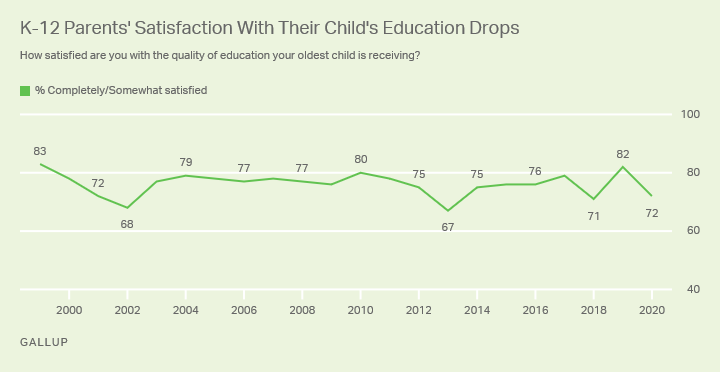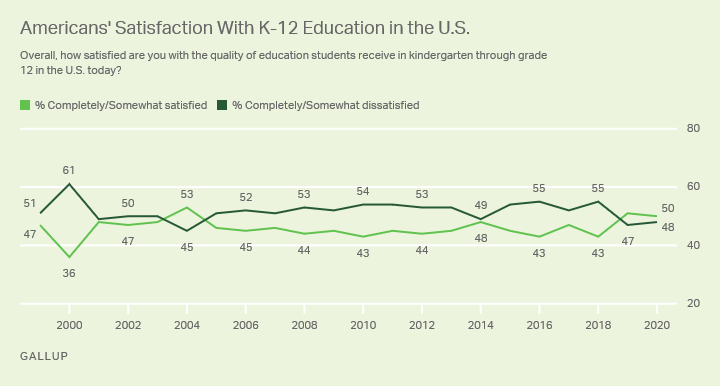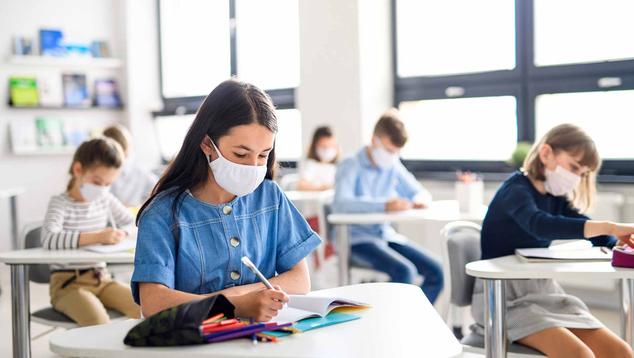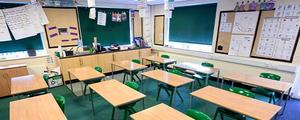Story Highlights
- Satisfaction with child's education drops 10 percentage points, to 72%
- Percentage of K-12 parents home-schooling this year has doubled, to 10%
- 50% of Americans are satisfied with quality of K-12 education in U.S.
WASHINGTON, D.C. -- As COVID-19 continues to disrupt schools in the U.S., parents of school-age children are significantly less satisfied than they were a year ago with the education their oldest child is receiving. Still, more than seven in 10 parents of students in kindergarten through high school are currently satisfied -- either completely (32%) or somewhat (40%) -- with the quality of their child's education.
This latest reading marks a 10-percentage-point drop in satisfaction and comes just one year after it reached its highest level in 20 years.

Line graph. Percentage of parents of students in kindergarten through twelfth grade who say they are completely or somewhat satisfied with the quality of education their oldest child is receiving since 1999. Currently 72 percent of K to 12 parents are completely or somewhat satisfied marking a 10 point decrease from 2019.
This decline in overall satisfaction among K-12 parents is largely due to a drop in the percentage saying they are completely satisfied, from 41% one year ago to 32% in the latest Gallup poll, conducted July 30-Aug. 12. This decrease comes as the coronavirus pandemic continues to ravage the U.S. and K-12 schools are being forced to adapt to keep students and staff members safe. While many school districts around the country will provide distance learning at the start of the 2020-2021 school year, as they did at the end of the last school year, many others have tried to find a way to offer in-person schooling.
Gallup's COVID-19 tracking poll in May found that although parents largely gave their child's school positive ratings for its remote learning, they found aspects of it to be challenging. Meanwhile, more recent data show that parents are torn about what type of schooling they prefer for the new school year and that teachers are "very concerned" about returning to their classroom.
Home Schooling Gains Some Momentum
While parents' satisfaction with their child's education has fallen, there has been a five-point uptick (to 10%) in the percentage of parents who say their child will be home-schooled this year.
The question defines home schooling as "not enrolled in a formal school, but taught at home" so as to clearly distinguish home schooling from distance learning provided by a school in which they are enrolled.
Public school remains the most attended type of school, although it has dropped seven points, to 76%, since last year. Far fewer parents say their child is enrolled in a private school (6%), charter school (5%) or parochial school (2%).
| 2019 | 2020 | ||||||||||||||||||||||||||||||||||||||||||||||||||||||||||||||||||||||||||||||||||||||||||||||||||
|---|---|---|---|---|---|---|---|---|---|---|---|---|---|---|---|---|---|---|---|---|---|---|---|---|---|---|---|---|---|---|---|---|---|---|---|---|---|---|---|---|---|---|---|---|---|---|---|---|---|---|---|---|---|---|---|---|---|---|---|---|---|---|---|---|---|---|---|---|---|---|---|---|---|---|---|---|---|---|---|---|---|---|---|---|---|---|---|---|---|---|---|---|---|---|---|---|---|---|---|
| % | % | ||||||||||||||||||||||||||||||||||||||||||||||||||||||||||||||||||||||||||||||||||||||||||||||||||
| Public school | 83 | 76 | |||||||||||||||||||||||||||||||||||||||||||||||||||||||||||||||||||||||||||||||||||||||||||||||||
| Home school | 5 | 10 | |||||||||||||||||||||||||||||||||||||||||||||||||||||||||||||||||||||||||||||||||||||||||||||||||
| Private school | 7 | 6 | |||||||||||||||||||||||||||||||||||||||||||||||||||||||||||||||||||||||||||||||||||||||||||||||||
| Charter school | 2 | 5 | |||||||||||||||||||||||||||||||||||||||||||||||||||||||||||||||||||||||||||||||||||||||||||||||||
| Parochial school | 4 | 2 | |||||||||||||||||||||||||||||||||||||||||||||||||||||||||||||||||||||||||||||||||||||||||||||||||
| GALLUP | |||||||||||||||||||||||||||||||||||||||||||||||||||||||||||||||||||||||||||||||||||||||||||||||||||
Americans' Satisfaction With K-12 Education Remains Stable
As was the case last year, Americans are about as likely to say they are satisfied (50%) as dissatisfied (48%) with the quality of K-12 education in the U.S.
Since Gallup began tracking this question annually in 1999, only about one in 10 U.S. adults report being completely satisfied with the quality of U.S. education. The low point in overall satisfaction with the nation's schools over the 21-year trend was 36% in 2000, when education was a key issue in the U.S. presidential election. The 53% high point in satisfaction was in 2004 as Republicans were overwhelmingly positive about the results of President George W. Bush's "No Child Left Behind" education reform law.

Line graph. Americans' satisfaction with the quality of education students in the U.S. in grades kindergarten through twelfth grade receive since 1999. Currently 50 percent of Americans are completely or somewhat satisfied and 48 percent are somewhat or completely dissatisfied.
Satisfaction with the quality of the nation's K-12 education among parents of school-age students is not statistically different from that among all Americans. Parents of K-12 students have been consistently more satisfied with the quality of their own child's education than they are with K-12 education in the U.S.
Bottom Line
Continuing to effectively educate America's youth has been one of the greatest challenges during the coronavirus pandemic. With no end in sight to the disruption, students and teachers have had to adapt to a new reality that includes social distancing, wearing masks and remote learning. Planning has proven to be exceedingly complicated and requires flexibility that is difficult to achieve when dealing with large numbers of students and staff members.
Although parents largely rated the performance of their child's school positively at the end of the last school year, they also reported experiencing considerable challenges brought on by the physical separation from classmates and teachers, a lack of motivation or attention span from their child, and balancing work while assisting their child with schoolwork.
The latest drop in satisfaction with the quality of their child's education is likely a result of some parents' concern about the effectiveness of remote schooling. This concern has no doubt contributed to the uptick in the percentage of students who will be home-schooled this year.
View complete question responses and trends (PDF download).
Learn more about how the Gallup Poll Social Series works.




